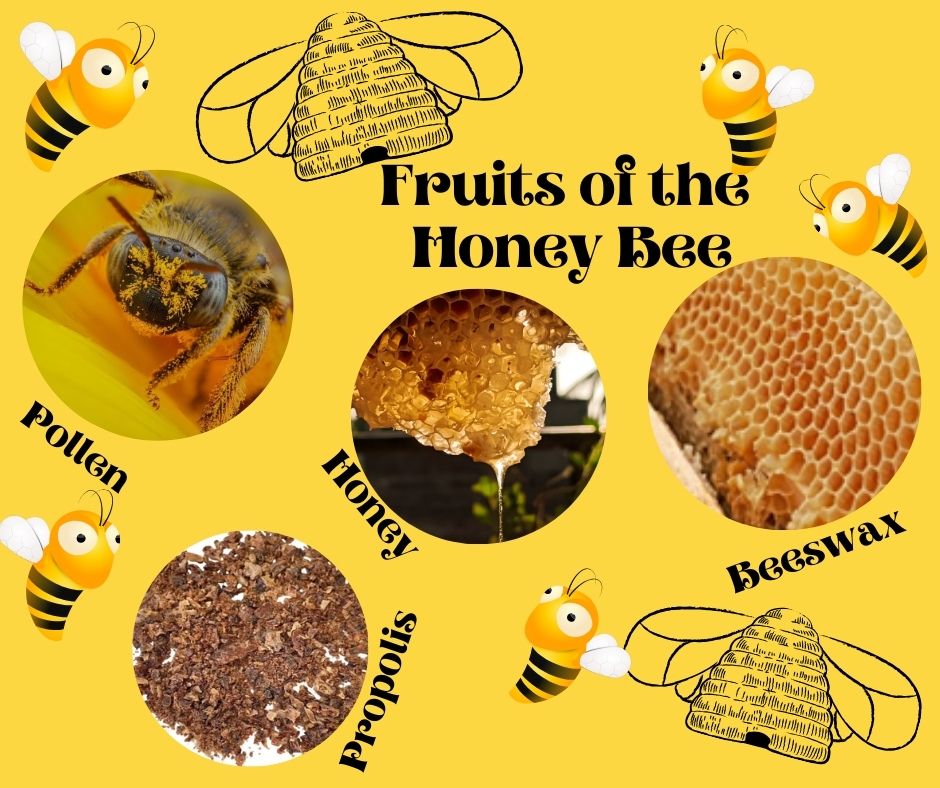Honey bees are vital not just for the products they provide, but for their crucial role in our ecosystem and health. Here’s a closer look at the multifaceted contributions of honey bees and the importance of their conservation:
The Gifts of Honey Bees
Honey: A natural sweetener with antibacterial properties, honey is rich in antioxidants and has numerous health benefits. It can soothe sore throats, aid digestion, and provide a quick energy boost.
Beeswax: Used in cosmetics, candles, and food wraps, beeswax is a natural, biodegradable product that also has antibacterial qualities. Investigate more on Beeswax in my blog "From Secrection to Beeswax/"
Pollen: Often considered a superfood, pollen is packed with vitamins, minerals, and proteins. It supports immunity and can provide an energy boost.
Propolis: This bee-produced resin has been used for centuries for its medicinal properties, including its potential anti-inflammatory and antimicrobial effects.
Royal Jelly: Naturally secreted from the Honey Bee head to feed brood referred to as the Hypopharyngeal . Worker Bee brood recieve only 3 - 4 days of Royal Jelly while the Queen Bee's diet is solely on Royal Jell to ensure she is a fully funcitoning sexual glands when she hatches out of her chamber. Royal Jelly is harvested from the hive and finally sold in commercial products such as supplements or skin care.
Bee Venom:
The Pollination Power
Honey bees are essential pollinators, responsible for the fertilization of many crops and wild plants. Their pollination services are invaluable, contributing to food production and biodiversity:
- Agricultural Impact: Approximately one-third of the food we consume relies on pollination. This includes fruits, vegetables, and nuts.
- Ecosystem Health: Pollination supports the growth of plants, which in turn provides habitat and food for other wildlife.
The Importance of Bee Venom Therapy
Bee venom therapy (BVT) is gaining attention in the health community for its potential benefits, particularly for conditions like arthritis and multiple sclerosis. The venom contains compounds that may reduce inflammation and boost the immune response, offering a natural alternative for some individuals.
The Canary in the Coal Mine
Honey bees serve as indicators of environmental health and our own personal health. Their decline signals potential problems in ecosystems, often linked to pesticide use, habitat loss, and climate change:
- Pesticides and Health: Chemicals used in agriculture not only threaten bee populations but can also impact human health, leading to concerns about the food supply and environmental safety.
- Biodiversity: The health of honey bees is intertwined with the overall health of ecosystems. Protecting them means protecting our food sources and the environment.
The Call for Conservation
Considering the plight of honey bees is crucial for our own health and well-being. Here are some ways to contribute to their conservation:
- Pesticide Awareness: Reduce or eliminate pesticide use in gardens. Opt for organic alternatives whenever possible.
- Plant Bee-Friendly Gardens: Incorporate native plants and flowers that attract bees and provide them with food sources.
- Support Local Beekeepers: Purchase honey and bee products from local sources to encourage sustainable beekeeping practices.
Conclusion
Honey bees do so much more than produce honey; they are vital to our ecosystem and health. By prioritizing their conservation, we also prioritize our own well-being and the health of our environment. Let’s work together to protect these incredible creatures and ensure a thriving planet for generations to come!

